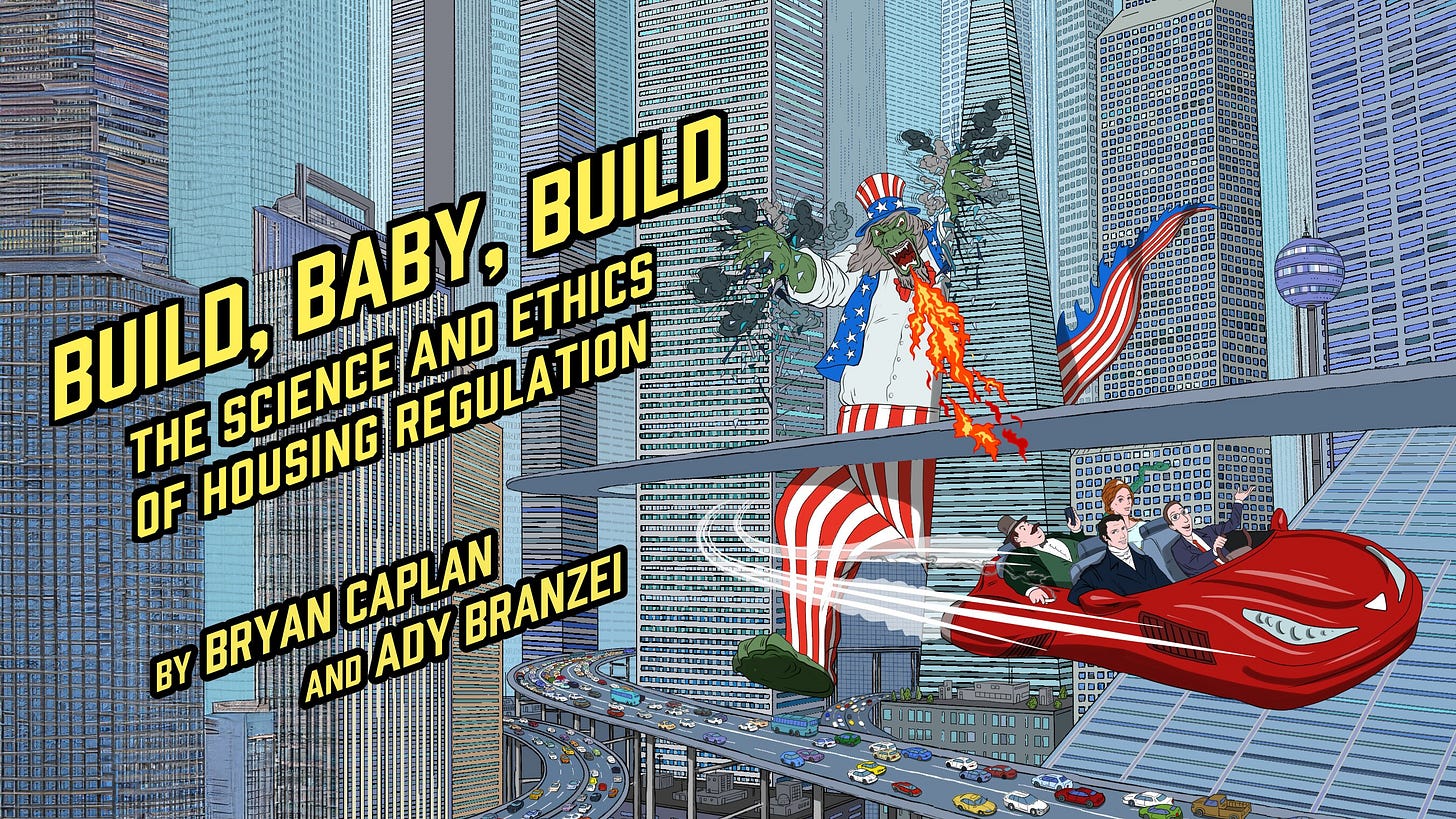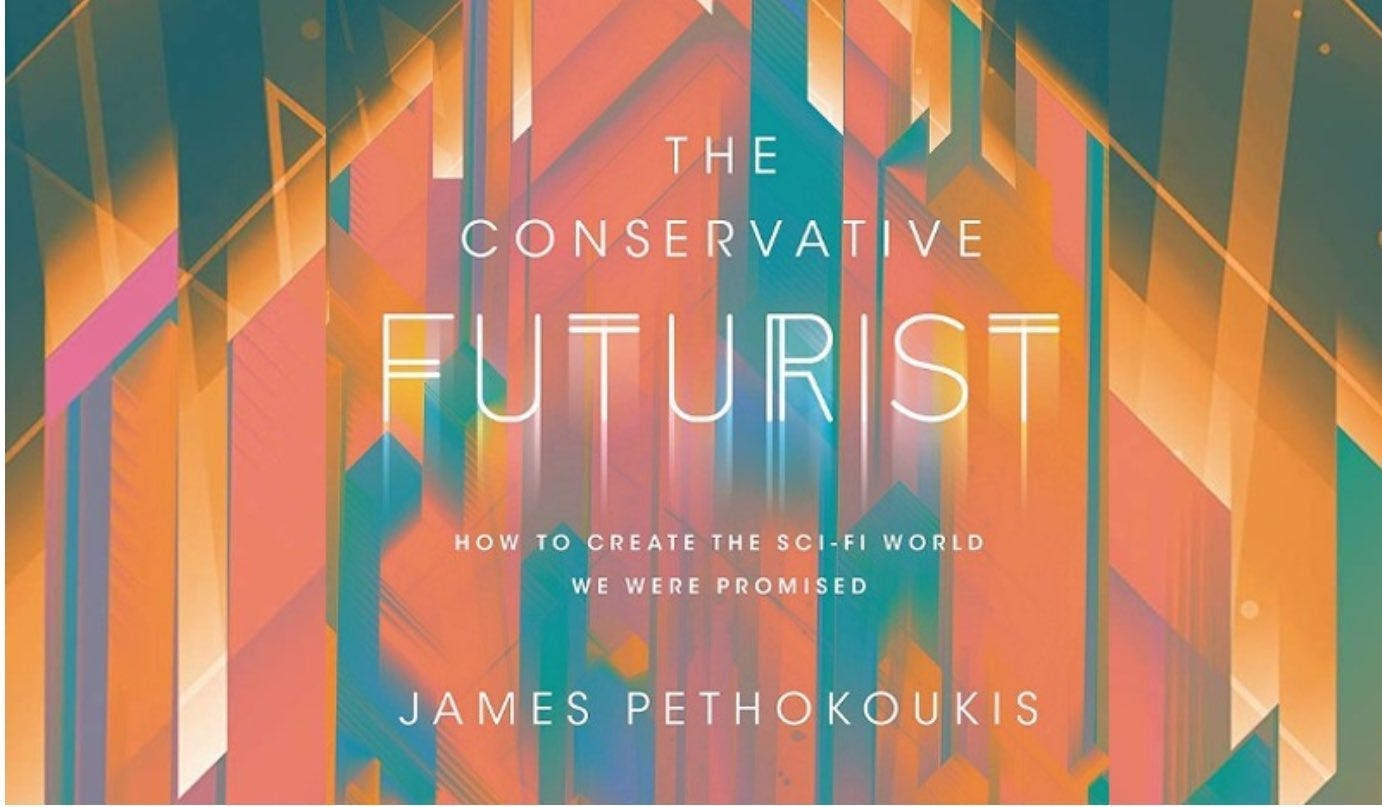Housing in the United States has come to be known as a panacea problem. Gone are the days when tossing the graduation cap meant picking up the keys to a front door, and the ripple effects of unaffordable housing stretch across society: poor social mobility, smaller families, worse retirement-readiness, just to name a few.
Today on Faster, Please — The Podcast, I talk to Bryan Caplan about the seemingly obvious culprit, government regulation, and the growing movement to combat it.
Caplan is a professor of economics atGeorge Mason University. His essays have been featured in the New York Times, Wall Street Journal, Washington Post, and TIME Magazine. He is editor and chief writer of theBet On It Substack, and is the author of several books, including Build, Baby, Build: The Science and Ethics of Housing Regulation.
In This Episode
America’s evolving relationship with housing (1:31)
The impact of regulation (3:53)
Different regulations for different folks (8:47)
The YIMBY movement (11:01)
Homeowners and public opinion (13:56)
Generating momentum (17:15)
Building new cities (23:10)
Below is a lightly edited transcript of our conversation.
(Note: This was recorded just before the presidential election.)
America’s evolving relationship with housing (1:31)
The main thing that changed is that we've seen a long-run runup of housing prices.
Pethokoukis: What was going on with housing prices and housing affordability from the war to the 1970s? Was it kind of flattish? People were recovering from the Great Depression; what was going on then?
Caplan: Yeah, it was quite flat, so there were decades where we had rapidly expanding population, the Baby Boom, and markets were working the way that markets normally do: You get demand going up, raises prices in the short run, but then that means the prices are above the cost of production, and so you get entry, and you build more until prices come back down to the cost of production. That's the way markets are supposed to work!
I don't know how people thought about their homes in the late ’40s, ’50s, and ’60s, but did they view them as, “This is our primary investment,” or did they view them more as a place to live? Were there any expectations that this was their retirement plan?
I honestly don't know. I don't remember reading anything about that. I grew up in Los Angeles where in the ’70s and ’80s people already had some sense of, “Your home is an important retirement vessel,” but it is plausible that when you are going back to earlier decades, people did have a different view.
I've often heard Americans say that Japanese don't think about their homes as retirement vessels, but I've never talked to anyone in Japan to assure me this is so, so I don't know.
But that scenario changed.
It did.
How did it change and are we confident we know why it changed?
The main thing that changed is that we've seen a long-run runup of housing prices. Depending upon what series you're looking at, the runup might be starting in the early ’70s or the early ’80s, but in any case, there was what economists would call a structural break where a series that was generally flat over the long term started rising over the long term. There have been a few times when prices fell back down, like after the Great Recession, but now, inflation adjusted, we are higher than the peak right before the Great Recession.
Now, is that the same as affordability? Because I assume incomes could be going up, so has it outpaced median income over that period?
Probably not, although it's in the right ballpark, and maybe.
One thing you can say is, well, there's regulation before, there's regulation after, so how can you go and blame the rise on the regulation?
The impact of regulation (3:53)
I would like to blame regulation. Intuitively, that makes sense to me, but I suppose we need more than intuition here.
. . . there's a lot of regulation almost everywhere a lot of people live.
I would say that we do have very good evidence that regulation is indeed to blame. If you look at it very quickly, you might say, “Well, there was regulation before; it didn't seem to matter that much.” The answer to this really was death by a thousand cuts, where we just piled regulation on regulation, but also where regulations that have been interpreted mildly before started being interpreted strictly afterwards.
How do we know that it really is regulation? The easiest thing to do is just to look at the strictness of regulation in different parts of the country, and you can see that there are some places that are crazy strict and the prices are crazy high. There's other places where the regulation is a lot lighter and even though they're getting plenty of population increase, they nevertheless do not have these long-run rises.
So the contrast between the Bay Area and the Texas Triangle is very strong. So these are both areas that, in some sense, they are growth areas, a lot of tech there, but the Bay Area has seen very little rise in the amount of housing and massive increase in prices, whereas Texas has, in contrast, seen a large rise in the number of houses and very low rises in the price of housing.
The main method that economists have used in order to disentangle all this is it really starts with trying to figure out: What is land that you are not allowed to build anything on worth? So just think about whatever your excess land is in a single-family area, you're not allowed to put another structure there, you can put a volleyball court or something like that. So you just find out, well, what is land where you can't build anything worth? And usually, even in a good area, that land is not worth much. If you can't build on it, it's like, I guess we can put some grass, but that's not that good. Then the next step is to just go to a construction manual and to see what the cost of construction is in a given area and then compare it to the price. This is a quite reasonable approach and it has gotten better over time because data has gotten better.
The main thing is that Joe Gyourko, who's been working on this for about 20 years, in his last big paper, he got data on actual vacant lots, and so you can see, this is a vacant lot, usually because you just can't build anything on it, can't get the permission, and as a result of this, he's also able to find out, how bad does the regulation get as you move away from the city center. We've got details like Los Angeles looks like it's regulated out to the horizon. You’ve got 50 miles away from downtown LA and it's still pretty bad regulation. On the other end, a city like Chicago is very regulated in the downtown, but 30 miles out, then there's not that much effect anymore.
The punchline of all this work is that there's a lot of regulation almost everywhere a lot of people live. If you want to go and build a skyscraper in the middle of nowhere in Kansas, you could probably do it, but you wouldn't want to build a skyscraper in the middle of nowhere in Kansas, that defeats the whole purpose of building a skyscraper.
That leads to two questions: The first question is, just to be clear, when we're talking about regulation, is it single-family homes versus multifamily? Is it also the coding, what the home has to be made out of? Do the walls have to be so thick, or the windows? What are we talking about?
The honest answer is that most economists’ estimates are just giving you an estimate of all regulation combined with a considerable agnosticism about what actually are the specific regulations that matter. There are other papers that look at specific kinds of regulation and come up with at least very credible claims that this is a big part of the puzzle.
The main things that matter a lot in the US: We've got height restrictions — those matter in your biggest, most expensive cities; you can just look at a place like Central Park or get a helicopter shot of San Francisco and say, don't tell me you can't build more stuff here. There's endless room to build more stuff here as long as you can go vertically.
It's also very standard to say that you are only allowed to have single-family homes in most residential land in the US, it's just zoned single family only, so you just are not legally allowed to squeeze in a larger number of dwellings.
Then you've got, even with single-family regulation, it's very standard to have minimum lot sizes, which just says that you've got to have at least like an acre of land per house, which, whenever I'm speaking in metric countries, I'm always telling, what is that . . .? It's a lot. It's a lot of land, and the amount of land that's normally required has gone up a lot. One-acre zoning in the past would've seemed crazy. Now plenty of places have five-acre zoning. You could obviously just squeeze way more houses in that space. And what is clear is that builders normally build the absolute maximum number they're allowed to build. Anytime someone is going up to the very border of a rule, that is a strong sign the rule is changing behavior.
Different regulations for different folks (8:47)
Very rarely did someone sit around saying, “You know what's great about Texas? Our lack of housing regulation.”
Why are these rules different in different places? That may be a dumb question. Obviously San Francisco is very different from Texas. Is the answer just: different places, different people, different preferences? Do we have any idea why that is?
Matt Kahn, who is based in Los Angeles, he's been I think at UCLA and USC, he's got a very good paper showing, at least in California, it's the most progressive left-wing places that have the worst regulation, and it just seemed to be very philosophical. On the other hand, I spent a lot of time during Covid in Texas. Very rarely did someone sit around saying, “You know what's great about Texas? Our lack of housing regulation.” It’s not so much that they are opposed to what's going on in California, it just doesn't occur to them they could be California.
In a way, you might actually get them to be proud about what they're doing if you could remind them, “Oh, it's really different in California,” and just take them on a tour, then they might come back and say, “God bless Texas.” But it's more of, there's the places where people have an ideological commitment to regulation, and then the rest of the country is more pragmatic and so builders are able to get a lot more done because there just aren't fanatics that are trying to stop them from providing the second most basic necessity for human beings.
Now, this is all striking because the YIMBY [Yes In My Backyard] movement, and my book Build, Baby, Build — I definitely think of that as a YIMBY book. My goal is to make it the Bible of YIMBY, and it's in comic book form, so it's a Bible that can be read by people starting at age five.
In any case, the YIMBY movement is definitely left-coded. People that are in that movement, they think of themselves as progressives, usually, and yet they are just a small piece of a much broader progressive coalition that is generally totally hostile to what they're doing. They are punching above weight and I want to give them a lot of credit for what they've been able to accomplish, and yet, the idea that YIMBYs tend to be left-wing and therefore they are the main people that are responsible for allowing housing is just not true. Most places in the country basically don't have a lot of pro- or anti-housing activism. They just have apathy combined with a construction industry that tries to go and build stuff, and if no one stops them, they do their job.
The YIMBY movement (11:01)
Who the hell decided that was a good idea that everybody should have an acre of land?
I want to talk a bit more about the economic harms and benefits of deregulation, but if I was a center-left YIMBY, I would think, “Oh, I have all kinds of potential allies on the right. Conservatives, they hate regulation.” I wonder how true that is, at least recently, it seems to me that when I hear a lot of conservatives talking about this issue of density, they don't like density either. It sounds like they're very worried that someone's going to put up an apartment building next to their suburban home, YIMBY people want every place to look [the same] — What's the home planet in Star Wars?
Yeah Coruscant, that that's what the YIMBYs want, they want an entire planet to look like a city where there's hundreds of levels, and I'm not sure there's the level of potential allyship on the right that center-left YIMBYs would want. Is that a phenomenon that you've noticed?
I actually I have a whole chapter in Build, Baby, Build where I try to go and say we can sell these policies to very different people in their own language, and if they actually believe their official philosophy, then they should all be coming down to very similar conclusions.
I think the main issue of center-left YIMBYs talking to people who are right wing or conservative, it's much more about polarization and mutual antipathy than it is about the people on the right would actually object to what they're hearing. What I say there is there are certain kinds of housing regulation that I think the conservatives are going to be sympathetic to. In particular, not liking multifamily housing in suburbs, but I don't really think there is any conservative objection to just allowing a lot more skyscrapers in cities where they don't even go. There's not going to be much objection there and it's like, “Yeah, why don't we go and allow lots of multifamily in the left-wing parts of the country?”
But I think the other thing is I don't think it's really that hard to convince conservatives that you shouldn't need to have an acre of land to go and have a house. That one, I think, is just so crazy, and just unfair, and anti-family, you just go and list all the negative adjectives about it. Did you grow up in a house on a one-acre lot? I didn't! Who the hell decided that was a good idea that everybody should have an acre of land? Wouldn't you like your kids to be able to walk to their friends' houses?
A lot of it seems to be that government is just preventing the development of something that people would actually want to live in. I remember when my daughter finally made a friend within walking distance, I wanted to light a candle, hallelujah! A child can walk to be friends with a child! This has not happened in all my years! But that was the normal way things were when you'd be on a quarter-acre or a third of acre when I was growing up.
Homeowners and public opinion (13:56)
People generally favor government policies because they believe . . . the policies are good for society.
If someone owns a house, they like when that price goes up, and they might see what you're saying as lowering the price of homes. If we were to have sort of nationwide deregulation, maybe deregulation where the whole country kind of looks like wherever the lightest-regulated place is. People are going to say, “That's bad for me! I own a home. Why would I want that?”
Lots of people think this, and especially economists like this idea of, of course we have all this regulation because it's great for homeowners; homeowners are the main wants to participate in local government. Sounds likely, but when we actually look at public opinion, we see that tenants are strong advocates regulation too, and it's like, gee, that really doesn't make any sense at all. They're the ones that are paying for all this stuff.
But it does make sense if you switch to a much simpler theory of what's going on, which fits the facts, and that is: People generally favor government policies because they believe —underscore believe — the policies are good for society. So many people from the earlier decades say, “Oh, all those Republicans, they just want tax cuts.” Now we're finally at the level where Republicans are poorer than Democrats. It's like, “Yeah, I guess it's getting a little bit hard to say that people become Republicans to get tax cuts when they're the ones paying lower taxes.” How about there's an actual disagreement about what policies are good for society, which explains why people belong to different parties, support different policies.
So most of what I'm doing in Build, Baby, Build is trying to convince people, look, I'm not impugning your motives, I don't think that you're just favoring whatever policies are selfishly best for you. I think that whatever policies you're into are ones that you think are genuinely good for your community, or your area, or your country, but we are not thinking very well about everything that's going on.
So part of it is that a lot of the complaints are just overblown or wrong, but another thing is that generally we base a regulation purely on complaints without any thought of any good thing that we might be losing. I make a big deal in the book about how, if you don't want to have noise, and traffic, and pollution, it's really easy — just move to some remote part of the country and you solve all those problems; yet hardly anybody wants to do that.
Why are people staying in congested areas with all these problems and paying a lot of extra money for them? Many of these people now have telework jobs, they don't even have a job reason to stay there. And the answer's got to be, there's just a bunch of really good things about living near other people that we hardly ever talk about and which have no political voice. There's almost no one's going to show up in a meeting and [say], “I favor this because I want there to be more commercial opportunities. I favor this because I want there to be more social opportunities, more cultural opportunities, more economic opportunities,” and yet these are all the reasons why people want to live near other people. So we have a set of regulation just based upon complaints: complaints which are generally out of context, not quantified. So we just see that people are willing to pay a lot of money for the package of living in an area with a bunch of other people, so that's got to mean that the good of other people exceeds the bad of the other people; otherwise, why aren't you living out in the middle of nowhere?
Generating momentum (17:15)
The sad truth is that symbolic issues are much more likely to get people excited, but this is something that determines the quality of life for most people in this country.
When I read the book, and I read a really good New York Times essay —
Would that be my essay, Jim?
I think it is your essay! In fact, it was, I should have been clearer on the author of that essay. The brilliant Bryan Caplan was the author of that essay.
If you look at the potential benefits on inequality, there's environmental impact, maybe people are really worried about birth rates, it really seems like housing really is sort of the “everything problem.”
Panacea problem, or the “housing theory of everything.”
It really does. I think the current election season, it's probably the most I've heard it talked about, and not really talked about very much.
And thoughtlessly. Spoken of thoughtlessly.
To me there seems to be a lot more — I'll use a nice think tank word — there's been a lot more ideation about the issue in recent years, and maybe it's only now kind of breaking through that filter where politicians start talking about it, but boy, when you look through what you've written about it, it seems like it should be a top three issue that politicians talk about.
The sad truth is that symbolic issues are much more likely to get people excited, but this is something that determines the quality of life for most people in this country. It's the difference between: Are you going to keep living with your parents until you're 30, or are you going to be able to afford to get your own place, start your own family? And again, it's one where older people remember how things used to be, and the idea of, well, why can't things just be like that? Why can't it be that a person who gets out of college can go and immediately afford to get a pretty good house?
At AEI, Mark Perry, for example, who is one of your colleagues, I think probably a remote colleague, he has done stuff on how new houses are better and so on, and that's also true, so I don't want to go and act like there's been no progress at all. But still, of course a lot of people are not moving into those new houses, they’re moving into old houses, which are the same as they were in the past, but just way more expensive if you want to go and live in that area
The other thing that is worth pointing out is that it's really temping to say, well, of course housing naturally gets more expensive as population rises. The period after World War II that we were mentioning, that's the Baby Boom era, population was rising at a much faster rate then than it did now, even counting immigration, and yet prices were much flatter because we were able to just go and legally build way more stuff.
I feel like you feel like you need to drive home the point about demand not being met by supply for this artificial reason: regulation. Even though, to me, it seems utterly natural and a classic case, people struggle to come up with alternative reasons that it's really not that. That it's because of . . . there’s private equity firms buying up all the homes, or the reason apartment rents go up is because there’s a cabal of apartment owners . . . They look for these other reasons, and I don’t quite get that when there seems to be a pretty obvious reason that we theoretically know how to fix.
Some of these other stories, they are half-truths, but they're not helpful. So the thing of, “Gee, if we just shut down tourism and letting foreign buyers buy stuff here, then demand will be lower, and prices will be lower, and we won't need to build anything new.” And it's like, do you realize what you're saying? You're basically saying that you want to destroy one of your best export industries.
If people around the world want to go and buy houses in your area, why do you want to turn them away instead of saying, cha-ching, let's capitalize on this by building a ton of housing for them? If there's a lot of tourists that want to go and rent a place in your area, why is it you want to go and strangle the market, which obviously it's a great industry — Build stuff and rent it to people, and it's not like there's some fixed amount unless the law says it must be fixed.
One benefit I didn't mention was social mobility where we need people, if they want to be able to move towards high-wage, high-productivity cities, to find good jobs, and then not have the wages of those good jobs mostly gobbled up by housing costs. That kind of circulation system, if that's the right phrase.
Certainly in some parts of the country, that has just been stopped and that has been a traditional way people move up the ladder.
We’ve got very good data on this. In earlier periods of US history, there was basically a foolproof way for someone in a low-income part of the country to get a big raise, and that was just to move. Steinbeck’s Grapes of Wrath not withstanding, this almost always works. It wasn't normally the case that you starve to death on your way to California from Oklahoma. Instead, normally, it's just a simple thing: You move from a low-wage area to a high-wage area and you get a lot more money, and you get a much higher take-home salary. But then in those days, there was not much difference in housing prices between different areas of the country, and therefore you would actually have a rise in not just your paycheck, but your standard living.
Now it's still true that you can get a rise in your paycheck by moving to the Bay Area. The problem is your standard of living, if you're coming from Mississippi, will generally crash because the housing cost eats up much more than 100 percent of the raise.
I remember I had a colleague who had a son who was an investment banker in the Bay Area. He and his wife were sharing a small apartment with two roommates, and it's like investment bankers can't afford apartments! Things have gotten out of hand, I think we can say with great confidence now.
Building new cities (23:10)
. . . politics is an area where there's a lot of ideas where it's like no one's trying it, it must be because it wouldn't work if tried, and then someone tries it with a little panache, or a little twist, and it catches on, and you're like, alright, maybe that's the real story.
Should we be building new cities somewhere? I think former President Trump has talked about this idea that we, is that something you've thought about at all?
Yes. I didn't put it into the book, but when I was writing up some follow-up posts on things that I wished I would've talked about, or just more speculative things, I do have some friends who are involved in that project to go and build a new city in the Bay Area. I hope it works.
There is always the problem of there's almost always going to be some existing people where you want to build your new city, and then what do you do about them? You can try buying them out. There is this holdout problem, a few people are going to stay there and say, “I'm not going to sell.” Or you could just go and do what happened in the movie Up: We'll buy everybody around you, and if you don't like it, too bad.
But on the other hand, it may be that activists will put a stop to your plan before you can get it off the ground. So in that case, it was going and selling off empty federal or state land, which we have in abundance. If I remember, I think that 23 percent of the land of the United States is owned by the federal government. Another 10 percent is owned by state governments. And even if you subtract out Alaska, there's still a ton. If you look at the map, it's really cool because you might think, “Oh, it's just that the government owns land no one in the right mind would want.” Not true.
Desert land in Nevada next to Area 51 or something.
Virtually all of Texas, even those western deserts, are privately owned. I've driven through them. Have you ever driven through West Texas?
I have.
Alright, so you're there and you're like, “Who wants to own this stuff?” And it's like, well, somebody at whatever the market price is considers this worth owning, and as to whether it's for mineral extraction, or for speculation on one day it'll be worth something when the population of Texas is greater, or they're going to do ranching there, I don't know. But it is at a price someone is willing to go and own almost every piece of land.
What the map really shows is it was ideology that led all this land to be held by the government. It's basically the ideology of conservation that we hear about. You get John Muir and Teddy Roosevelt, and as a result, they didn't just wind up protecting a few really beautiful national parks, they wind up putting millions of square miles of land off-limits for most human use.
Again, when the population of the country is lower, maybe it didn't even matter that much, but now it's like, “Hey, how about you go and sell me a hundred square miles so I can put a new city here?” The idea that an Elon or Zuckerberg couldn't go and just say, “I'm putting a pile of money into this. I'm going to build a new city and have a decent chance of it working.” Maybe it would be just a disaster and they waste their money. Then more likely I think it's going to be like Seward’s Folly where it's like, “What's the point of buying Alaska?” Oh, actually it was fantastic. We got a great bargain on Alaska and now it is an incredible, in hindsight, investment.
As we were talking, I started thinking about Andrew Yang who ran for president, I think that was in 2020, and he had one issue, really: Universal Basic Income. He thought that he had found an issue that was going to take him to the White House. It did not.
I kind of think if you were going to have a candidate focus a lot on one issue, this would not be a bad issue, given how it touches all these concerns of modern American society.
As an economist, I always hesitate to say that anyone who is a specialist in an area and is putting all their resources into it is just royally screwing up. At the same time, politics is an area where there's a lot of ideas where it's like no one's trying it, it must be because it wouldn't work if tried, and then someone tries it with a little panache, or a little twist, and it catches on, and you're like, alright, maybe that's the real story.
Just to give Trump credit where credit is due, there's just a lot of things that he said that you would think would've just destroyed his candidacy, and instead it seemed like he came out and he was more popular than ever. Maybe he just saw that there were some ideas that are popular that other people didn't realize would be popular.
Now I'm not optimistic about what he's going to do about housing, although anytime he says one good thing, it's like, I don’t know, maybe he'll just get fixated on that, but more likely ADHD will kick in, unfortunately.
But just to go and allow one new laissez-faire city to be built on federal land in some non-crummy area of the country — just as a demonstration project, the value of that would be enormous, just to see, hey, there's no reason why you can't have spacious, cheap homes in a really nice area that is not that remote from the rest of the country. Just imagine the airport you could build there, too — before all the noise complaints. You probably know about the noise complaints against Reagan Airport and how one single guy filed over half the complaints. It's like, how are we going to build anything? Let's build it all before that guy shows up!
On sale everywhere The Conservative Futurist: How To Create the Sci-Fi World We Were Promised
Micro Reads
▶ Economics
Trump Could Win the Contest With China Once and for All - NYT Opinion
▶ Business
Nvidia’s message to global chipmakers - FT Opinion
▶ Policy/Politics
How Elon Musk could disrupt Washington - Politico
Semiconductors and Modern Industrial Policy - Journal of Economic Perspectives
▶ AI/Digital
▶ Biotech/Health
▶ Clean Energy/Climate
▶ Robotics/AVs
▶ Space/Transportation
Former Officials Warn Lawmakers of Alleged Secret UAP Programs Operating Beyond Congressional Oversight - The Debrief
▶ Up Wing/Down Wing
▶ Substacks/Newsletters
Here's What I Think We Should Do - Hyperdimensional
What is OpenAI's Operator and Blueprint? History and Tips of Prompt Engineering from 2020 to 2025 - AI Supremacy
People want competence, seemingly over everything else - Strange Loop Canon
Please check out the website or Substack app for the latest Up Wing economic, business, and tech news in this edition of the newsletter.














